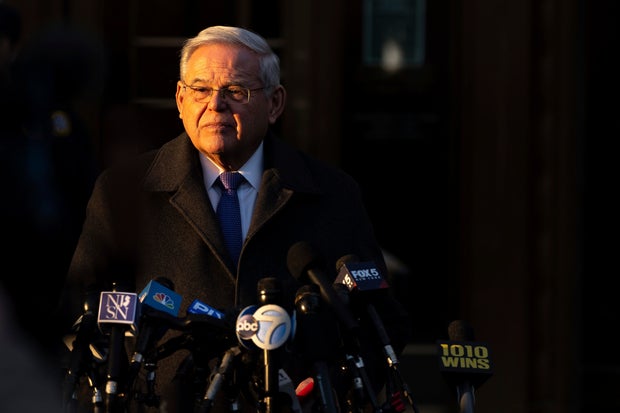In a significant turn of events, former U.S. Senator Bob Menendez commenced his 11-year prison sentence on Tuesday morning, following his conviction on serious federal bribery charges. He reported to the Federal Correctional Institution, Schuylkill, located in Minersville, Pennsylvania. This facility, situated about three hours away from Menendez’s residence in Englewood Cliffs, New Jersey, accommodates approximately 1,200 inmates within its medium- and minimum-security structures.
Bob Menendez, now 71 years old, was supposed to begin his incarceration on June 6. However, according to reports provided by CBS News New York, he petitioned for a slight postponement to attend his step-daughter’s wedding in Massachusetts, a request that seems to have been granted.
The institution where Menendez is now housed does offer certain amenities and allowances. Every month, he is entitled to 300 minutes of phone calls as well as unlimited email access, providing some level of contact with the outside world. Moreover, Menendez can receive up to four visitors per month, allowing him minimal yet significant interaction with family and friends while he serves time.
Menendez’s legal troubles stem from charges that he accepted bribes in exchange for political favors. These bribes included substantial sums of money and other valuable items which were believed to influence his decision-making in his capacity as a senator. Specifically, the former senator was accused of aiding New Jersey business owners fend off criminal investigations and facilitating a meeting between U.S. and Egyptian officials which eventually helped Egypt procure $300 million in U.S. military aid.
During an FBI raid on his residence, agents discovered $480,000 in cash hidden within his home. Additionally, they found gold bars valued at an approximate $150,000 and a luxury convertible, which further compounded his legal woes.
The bribery scandal not only engulfed Menendez but also implicated his wife, Nadine Menendez, and two business owners, all of whom faced the judicial system. Nadine Menendez was found guilty in April of related charges, with her sentencing scheduled for September 11.
Before his fall from grace, Menendez was a prominent figure in U.S. politics, having served in the Senate since 2006 and been a powerful chair of the Senate Foreign Relations Committee. His resignation from the Senate occurred just a month after his conviction, signifying a dramatic and stark end to his political career.
Characterizing Menendez, former New Jersey state assemblyman John Wisniewski recalled him as not only a capable legislator but also as a formidable political figure whose authority was both respected and feared. “He was always a government legislator, but he was also a political boss, and you did not cross Bob Menendez lightly or without any fear of repercussions,” Wisniewski stated.
Despite the overwhelming evidence and his subsequent conviction, Menendez has consistently proclaimed his innocence. He even attempted, unsuccessfully, to remain free on bail while appealing his conviction—a motion that was recently denied by a federal appeals court. During his sentencing in January, Menendez sought leniency by expressing remorse for his actions but also highlighting his positive contributions above his mistakes. “I am far from a perfect man,” he admitted, “I have made more than my share of mistakes and bad decisions. I’ve done far more good than bad.”
Adding a layer of controversy to his defense, Menendez suggested that his prosecution was politically motivated, tied to his opposition to certain policies of then-President Obama concerning Iran and Cuba. He noted on social media that the charges against him stemmed from internal party disagreements rather than justifiable legal grounds.
In his battle against the charges and his conviction, Menendez even appeared to seek a presidential pardon, aligning his criticisms with those voiced by President Trump against the judicial system, particularly in New York. His vocal support for Trump’s criticisms has been interpreted by some, like Wisniewski, as a strategic move to leverage potential executive clemency.
As this legal drama unfolds, the broader implications of Menendez’s fall from power continue to resonate within political and legal communities, provoking debate about legal accountability, political integrity, and the potential consequences of abuse of power.
The continuing coverage and updates about Bob Menendez’s case underscore perceptible shifts in political accountability and reflect ongoing public interest in the outcomes of such high-profile cases.









